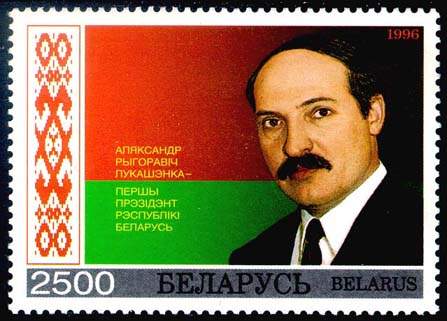Spinning with Batka
In the relations between the European Union and Belarus not much has changed for quite some time: sanctions, thaws, threats and so on. Lukashenko’s recent request for western ambassadors to leave Minsk has added just one more dizzying spin.
February 29, 2012 -
Andrzej Brzeziecki
-
Articles and Commentary

1996._Stamp_of_Belarus_0205.jpg
A request for the EU and Polish envoys to leave the country is one of the strongest decisions Lukashenko’s regime could have made. It is hard to say if this is a culmination of the diplomatic and media war between Europe and Belarus or whether we should be prepared for worse. This request was Minsk’s reaction to the new block of sanctions levelled against Belarusian officials. Without a doubt Lukashenko’s decision fits into the broader context of this regime’s policy: we have already witnessed the propaganda attacks on Poland from Belarusian TV, and before that, attacks on the independence of the Union of Poles in Belarus.
Throughout the whole of last year, Minsk was accusing Warsaw of sponsoring anti-Lukashenko demonstrations and was coming up with more and more new absurd accusations. It is hard to say whether Lukashenko really believes in all of this, or if the circles closest to him (those who would be most hit by the sanctions) could not or do not want to explain the real reasons for the protests to their boss. The correct, and most obvious, answer would be a killer for them, or for Lukashenko himself. Hence, they are urging Lukashenko to take on Poland and Europe, and he believes them and shows a threatening sign, not with a finger but a whole fist, to the West.
It is difficult to resist the impression of a certain repetitiveness in Minsk’s relations with the rest of the world. Elections, protests, arrests, wooing of the West with pretend dialogue, giving in to Moscow and giving away the industry to the Russians, more arrests, more elections, more protests, new propaganda films on TV, diplomatic rows, attempts to trade political prisoners (amnesty in exchange for credit) – all with a quite precise repetitiveness that has be observed in Belarus since the mid-1990s. Clearly, the answer on how to get out of this magic circle is nowhere to be seen.
Again, we need to wait for Minsk to make a new step and guess what these threats and rhetoric about forceful solutions could mean. Does he want to hurt the Polish minority living in Belarus? Is it only a request to leave the country, or will our ambassadors become personae non gratae? Will he drop diplomatic relations altogether? Close the borders? Or maybe, believing that his plans have been implemented (although it is unclear which ones) he will start to establish a dialogue with the EU and begin sucking up to the IMF?
We are on a rollercoaster ride with Lukashenko and not much seems to be indicating that we are able to stop him leading this unfortunate merry dance, or at least give it some rhythm. It was Lukashenko who managed to break the solidarity among the EU countries and thanks to Slovenia’s objection, save an oligarch and his close ally from sanctions. Lukashenko can not only play with the EU, but also within the EU from which, one might think, he is so far away. This is a new and bitter lesson.
Translated by Iwona Reichardt
Andrzej Brzeziecki is Editor-in-Chief of New Eastern Europe and Nowa Europa Wschodnia.


































